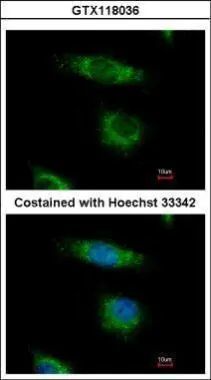
WB analysis of human spleen lysate using GTX89176 OSBPL5 antibody, N-term. Dilution : 0.2μg/ml Loading : 35μg protein in RIPA buffer
OSBPL5 antibody, N-term
GTX89176
ApplicationsWestern Blot
Product group Antibodies
ReactivityHuman
TargetOSBPL5
Overview
- SupplierGeneTex
- Product NameOSBPL5 antibody, N-term
- Delivery Days Customer9
- Application Supplier NoteWB: 0.2-0.6microg/ml. *Optimal dilutions/concentrations should be determined by the researcher.Not tested in other applications.
- ApplicationsWestern Blot
- CertificationResearch Use Only
- ClonalityPolyclonal
- Concentration0.50 mg/ml
- ConjugateUnconjugated
- Gene ID114879
- Target nameOSBPL5
- Target descriptionoxysterol binding protein like 5
- Target synonymsOBPH1, ORP5, oxysterol-binding protein-related protein 5, ORP-5, OSBP-related protein 5, oxysterol-binding protein homolog 1, oxysterol-binding protein homologue 1
- HostGoat
- IsotypeIgG
- Protein IDQ9H0X9
- Protein NameOxysterol-binding protein-related protein 5
- Scientific DescriptionThis gene encodes a member of the oxysterol-binding protein (OSBP) family, a group of intracellular lipid receptors that play a key role in the maintenance of cholesterol balance in the body. Most members contain an N-terminal pleckstrin homology domain and a highly conserved C-terminal OSBP-like sterol-binding domain. This gene has been shown to be imprinted, with preferential expression from the maternal allele only in placenta. Transcript variants encoding different isoforms have been identified. [provided by RefSeq, Oct 2010]
- ReactivityHuman
- Storage Instruction-20°C or -80°C,2°C to 8°C
- UNSPSC12352203



